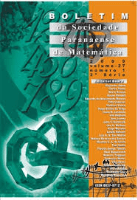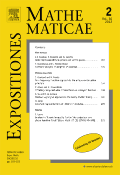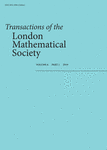
Boletim Sociedade Paranaense de Matematica
Scope & Guideline
Unlocking the Future of Mathematical Inquiry
Introduction
Aims and Scopes
- Mathematical Analysis and Differential Equations:
Research focusing on the properties, solutions, and behaviors of differential equations, including fractional, impulsive, and boundary value problems. - Algebra and Number Theory:
Studies related to algebraic structures, number fields, and properties of rings, including fixed point theorems and algebraic independence. - Topology and Geometry:
Exploration of topological spaces, geometric properties of manifolds, and their implications in various mathematical contexts. - Applied Mathematics and Simulation:
Application of mathematical theories to real-world problems, including epidemiological models, financial mathematics, and numerical simulations. - Function Theory and Special Functions:
Research on specific functions, their properties, transformations, and applications in solving complex mathematical problems. - Statistical and Probabilistic Methods:
Analysis of statistical models, probabilistic frameworks, and their applications in various fields, including econometrics.
Trending and Emerging
- Fractional Calculus and Differential Equations:
An increasing number of studies are exploring fractional derivatives and their applications in various mathematical models, indicating a growing interest in this area. - Complex Systems and Dynamics:
Research on complex dynamical systems, including epidemic models and stochastic processes, has seen significant growth, reflecting the need for mathematical modeling in real-world scenarios. - Numerical Analysis and Computational Methods:
A surge in papers employing numerical methods to solve differential equations and optimization problems highlights the importance of computational techniques in modern mathematics. - Fuzzy Logic and Soft Computing:
Emerging research in fuzzy sets and soft computing techniques indicates a trend towards tackling uncertainty and imprecision in mathematical modeling. - Graph Theory and Combinatorial Structures:
There is a noticeable rise in research related to graph theory, especially concerning applications in network analysis and combinatorial optimization.
Declining or Waning
- Classical Geometry:
Interest in classical geometric problems has diminished, with fewer papers addressing traditional geometric constructions and properties. - Elementary Number Theory:
Research focused on elementary aspects of number theory has seen a decline, possibly due to a shift towards more complex algebraic structures and computational methods. - Historical Mathematical Methods:
Papers discussing historical approaches or classical methods in mathematics have become less frequent, reflecting a broader trend towards modern techniques and applications.
Similar Journals

Results in Mathematics
Pioneering Discoveries in Applied and Theoretical Mathematics.Results in Mathematics, published by SPRINGER BASEL AG, is a prestigious academic journal dedicated to advancing the field of mathematics since its inception in 1978. Based in Switzerland, this journal has garnered a significant reputation, holding a Q2 ranking in both Applied Mathematics and miscellaneous Mathematics categories according to the latest 2023 metrics. The journal is a vital resource for researchers, professionals, and students, encouraging open dialogue about emerging mathematical concepts and methodologies. Our editorial objective is to publish high-quality research articles that contribute to theoretical advancements and practical applications in mathematics. Although it does not currently offer open access options, it provides in-depth studies and articles that fortify the knowledge base within the mathematical community. With a commitment to innovation and academic rigor, Results in Mathematics continues to serve as an essential platform for scholarly communication and exploration.

EXPOSITIONES MATHEMATICAE
Championing Excellence in Mathematical ScholarshipEXPOSITIONES MATHEMATICAE, published by Elsevier GmbH, stands as a significant journal in the realm of mathematics, catering primarily to researchers, professionals, and students. With an ISSN of 0723-0869 and an E-ISSN of 1878-0792, this journal has made its mark in the academic community, boasting a Q2 classification in the miscellaneous mathematics category for 2023, illustrating its prominence within its field. The journal addresses a diverse scope of mathematical topics, encouraging the publication of original research and innovative theories while maintaining rigorous academic standards. As it converges from 2004 to 2024, EXPOSITIONES MATHEMATICAE continues to be an essential resource for advancing mathematical knowledge and fostering scholarly communication, despite being a non-open-access publication. Its location in Munich, Germany further anchors it within a rich intellectual tradition, providing accessibility for the mathematical community worldwide.

Pure and Applied Mathematics Quarterly
Exploring the Depths of Theoretical and Practical MathematicsPure and Applied Mathematics Quarterly is a prestigious journal published by INT PRESS BOSTON, INC, focusing on the diverse and evolving field of mathematics. Since its inception in 2007, this journal has grown significantly, currently holding a Q1 ranking in the Mathematics (Miscellaneous) category for 2023, positioning it among the leading publications in the discipline. With a commitment to publishing high-quality research, Pure and Applied Mathematics Quarterly fosters innovation and dialogue within the mathematical community by providing a platform for theoretical advancements and practical applications. The journal remains accessible to researchers and professionals through its ISSN 1558-8599 and E-ISSN 1558-8602, although it does not currently offer open access. As a vital resource for mathematicians, educators, and students, this journal endeavors to expand the frontiers of mathematical knowledge and contribute to the academic dialogue surrounding this fundamental science.

HOUSTON JOURNAL OF MATHEMATICS
Cultivating Academic Dialogue in Mathematical ResearchHOUSTON JOURNAL OF MATHEMATICS, published by the University of Houston, serves as a valuable platform for disseminating significant findings in the field of mathematics, specifically within the realm of miscellaneous mathematics. Despite its current categorization in Q4 for 2023, the journal plays a crucial role in fostering academic discussion and exploration among researchers, professionals, and students alike. With its ISSN 0362-1588, the journal has been publishing original research since 1996, with a recent gap filled from 2022 to 2023, thereby continuing to contribute to the mathematical community. While it does not currently offer open access options, the journal's commitment to quality research maintains its relevance within the field and invites submissions that can elevate its standing. Located in the vibrant city of Houston, Texas, the journal not only emphasizes theoretical advancements but also encourages applied mathematical research that intersects with other disciplines, enhancing its significance and reach.

ANNALES DE L INSTITUT FOURIER
Championing Rigorous Research and CollaborationANNALES DE L INSTITUT FOURIER is a premier academic journal published by ANNALES INST FOURIER, specializing in the fields of Algebra and Number Theory as well as Geometry and Topology. Since its establishment, the journal has garnered a distinguished reputation, evidenced by its Q1 quartile ranking in the 2023 category assessments and its Scopus Rank of #37 out of 119 in Algebra and Number Theory, and #34 out of 106 in Geometry and Topology, placing it within the top percentile of its field. The journal serves as a vital platform for disseminating groundbreaking research and innovative methodologies, catering to a global audience of researchers, professionals, and students. With a commitment to the advancement of mathematical sciences, ANNALES DE L INSTITUT FOURIER invites contributions that push the boundaries of knowledge and foster collaboration across disciplines. Although it does not offer open access, the rigorous peer-review process ensures that published papers meet the highest academic standards, making it a critical resource for anyone engaged in advanced mathematical research.

Analele Stiintifice ale Universitatii Ovidius Constanta-Seria Matematica
Fostering Global Collaboration in Mathematical ResearchAnalele Stiintifice ale Universitatii Ovidius Constanta-Seria Matematica is a prominent open-access journal established by OVIDIUS UNIV PRESS in Romania, dedicated to advancing the fields of mathematics, specifically in Analysis and Applied Mathematics. Since its inception, the journal has emphasized the dissemination of high-quality research, making it accessible to a global audience. With an ISSN of 1224-1784 and E-ISSN 1844-0835, it has positioned itself within the academic community, achieving a respectable Q3 ranking in both analysis and applied mathematics in 2023, reflecting its commitment to rigorous scholarship. The journal spans a considerable publication window from 2009 to 2024, catering to the ongoing developments in mathematical sciences and their applications. Researchers, professionals, and students alike will find valuable insights and contributions that enrich their understanding and foster collaboration within the mathematical community. The journal's headquarters is based at the Faculty of Mathematics & Computer Science, Bulevardul Mamaia 124, Constanta, Romania.

Transactions of the London Mathematical Society
Transforming Mathematical Inquiry Through Open AccessTransactions of the London Mathematical Society is a prestigious journal published by WILEY, dedicated to advancing the field of mathematics across various sub-disciplines. With its commitment to Open Access since 2014, the journal ensures that research findings are widely disseminated and accessible to a global audience, enhancing collaboration and innovation in the mathematical community. Based in the United States, this journal enjoys a prominent position within the academic landscape, evidenced by its Q1 ranking in the 2023 Mathematics (miscellaneous) category and its ranking of 181 out of 399 in the General Mathematics category on Scopus, placing it at the 54th percentile. The journal publishes high-quality, peer-reviewed research articles and surveys that aim to foster advanced study and discussion in mathematical sciences, making it an invaluable resource for researchers, professionals, and students alike. With a focus on original research and significant contributions, the Transactions of the London Mathematical Society continues to play a crucial role in the evolution of mathematical inquiry.

Tamkang Journal of Mathematics
Cultivating a Community of Innovators in Mathematics and Materials ScienceTamkang Journal of Mathematics, published by TAMKANG UNIVERSITY, serves as a vital platform for researchers and professionals in the fields of applied mathematics, general mathematics, and materials science. With an ISSN of 0049-2930 and an E-ISSN of 2073-9826, this journal has established itself within the academic community, particularly noted for its contributions from Taiwan. Although categorized as Q4 in Applied Mathematics and Q3 in multiple related fields according to the 2023 ranking, it maintains a solid reputation for disseminating significant research findings and innovative methodologies. Researchers can explore an array of topics within its pages, making it an excellent resource for enhancing mathematical knowledge and applications. As it converges from 2005 to 2024, the journal invites academics, professionals, and students to engage with its content and contribute to the ongoing dialogue in mathematics and its interdisciplinary applications.

European Journal of Mathematics
Unveiling New Theories and ApplicationsWelcome to the European Journal of Mathematics, a prominent publication that serves as a vital platform for disseminating high-quality research in the field of mathematics. Published by Springer International Publishing AG, this journal has witnessed significant growth since its inception in 2015 and is recognized for its contributions within the Q2 category of Mathematics (miscellaneous) as per the 2023 rankings. With an ISSN of 2199-675X and an E-ISSN of 2199-6768, the journal aims to foster innovation and collaboration among researchers, professionals, and students alike. Although it operates under a traditional access model, the journal's commitment to advancing mathematical knowledge and applications cannot be overstated. Positioned among the top-tier publications, the European Journal of Mathematics is an essential resource that encourages the exploration of emerging trends and theories in mathematics, making it indispensable for anyone striving to stay at the forefront of this dynamic field.

Archivum Mathematicum
Bridging Theory and Practice in MathematicsArchivum Mathematicum is an open-access journal dedicated to the broad spectrum of Mathematics, published by Masaryk University, Faculty of Science in the Czech Republic. Since its inception in 1965, this journal has provided a platform for the dissemination of research and advancements within the mathematical sciences. It spans converged years from 2004 to 2024, ensuring ongoing relevance in a rapidly evolving discipline. Currently categorized in Q4 for 'Mathematics (miscellaneous)' and ranked #316/399 in general mathematics by Scopus, the journal aims to foster a collaborative environment for researchers, practitioners, and students alike, encouraging submissions that contribute to mathematical theory, applications, and education. With its commitment to open access, Archivum Mathematicum is a vital resource for anyone seeking to stay informed about emerging trends and findings in the field.